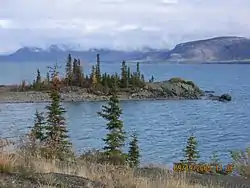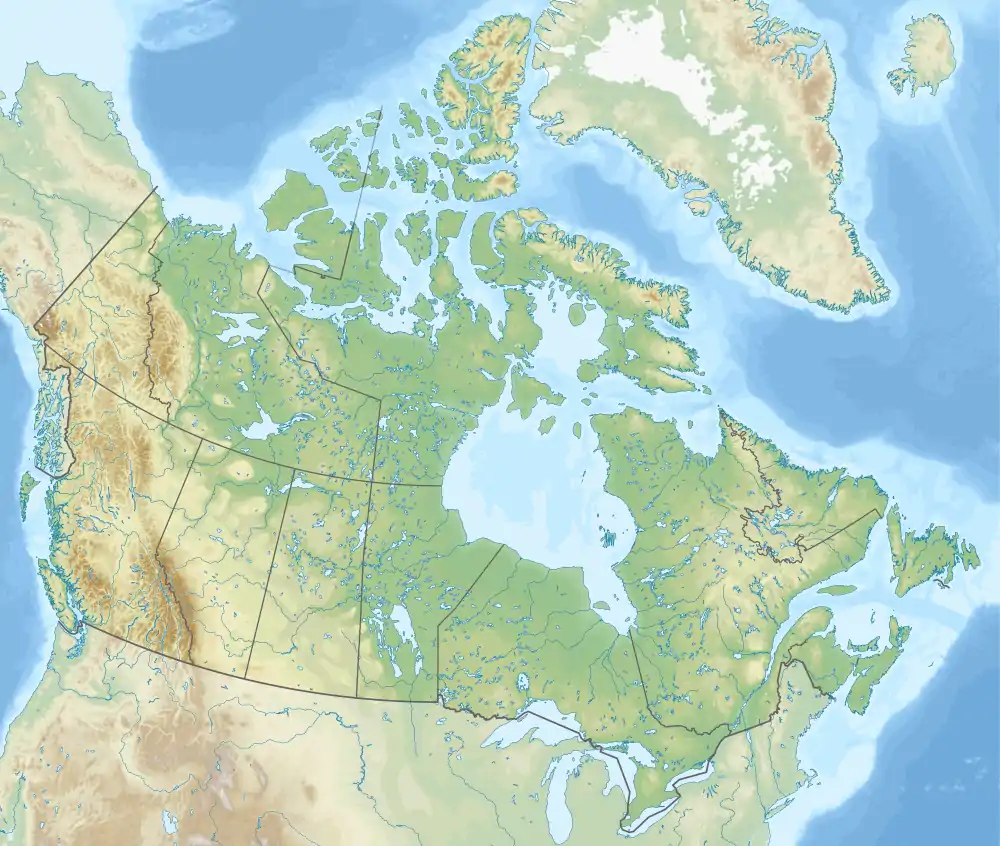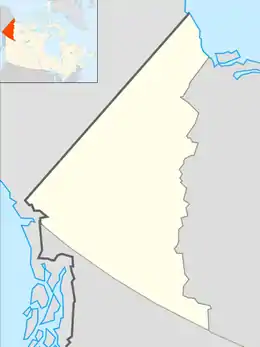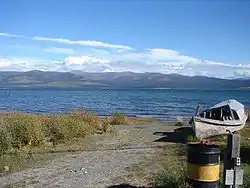Kluane Lake
Kluane Lake is located in the southwest area of the Yukon. It is the largest lake contained entirely within Yukon at approximately 408 km2 (158 sq mi),[1]:1 and 81 km (50 mi) long.[1]:1
| Kluane Lake | |
|---|---|
 | |
 Kluane Lake  Kluane Lake | |
| Location | Yukon |
| Coordinates | 61°14′N 138°40′W |
| Primary inflows | Formerly the Slims River |
| Primary outflows | Kluane River |
| Catchment area | Bering Sea Watershed |
| Basin countries | Canada |
| Max. length | 81 km (50 mi)[1]:1 |
| Surface area | c. 408 km2 (158 sq mi)[1]:1 |
| Average depth | 31 m (102 ft) |
| Max. depth | 91 m (299 ft)[1]:1 |
| Surface elevation | 781 m (2,562 ft)[1]:1 |
| Settlements | Burwash Landing, Destruction Bay |
Until 2016,[2][3] Kluane Lake was fed by the A'ay Chu (Slims River),[1] which was composed of meltwater from the Kaskawulsh Glacier, located within Kluane National Park. It drains into the Kluane River, whose waters flow into the Donjek River, White River, Yukon River, and eventually the Bering Sea. The lake has a high density of large-bodied lake trout and whitefish[1]:1 and is known for its fishing.
Kluane Lake is located approximately 60 km (37 mi)[1]:1 northwest of Haines Junction.[1]:1 The lake has a mean depth of 31 m (102 ft) and a maximum depth of 91 m (299 ft)[1]:1
The Alaska Highway follows most of Kluane Lake's southern border, and the drive offers views of the lake.
Communities

The Yukon communities of Burwash Landing and Destruction Bay are located on the southern shore of the lake.[1]:1
Northern Mountain Caribou
The Aishihik and Kluane caribou herds migrate in the area surrounding Kluane and Aishihik Lakes. They are a northern mountain caribou, a distinct ecotype of the woodland caribou. In 2009, there were 181 caribou in the Kluane herd (also known as the Burwash herd) and 2044 caribou in the Aishihik herd. The Kluane herd was declining while the Aishihik herd was increasing.[4]
References
- Barker, Oliver; Millar, Nathan; Foos, Aaron (2014), Lake Trout and Lake Whitefish Population Assessment Kluane Lake 2013 (PDF), Yukon Fish and Wildlife Branch
- Shugar, Daniel H.; Clague, John J.; Best, James L.; Schoof, Christian; Willis, Michael J.; Copland, Luke; Roe, Gerard H. (May 2017). "River piracy and drainage basin reorganization led by climate-driven glacier retreat". Nature Geoscience. 10 (5): 370–375. doi:10.1038/ngeo2932. ISSN 1752-0894.
- "Retreating Yukon glacier makes river disappear". CBC News. Retrieved 2017-02-21.
- Hegel, Troy; Russell, Kyle (2010), Aishihik and Kluane Northern Mountain Caribou Herds Census, 2009 (PDF), Yukon Government, retrieved 17 December 2014
